Honoring the creative God with a rave
Matthew Fox is a longtime priest who now ministers in the Episcopal Church after being kicked out of ours because of his radical teachings on cosmology: he's the creator of Creation Spirituality, which holds that God, through creative force, is present in all creation (panentheism.) He is a theologian who expends energy both on calling the Church to greater holiness and on studying and teaching those elements of theology that have very little to do with transitory issues of church reform. Some thoughts of his I gleaned from (and yes, I am still on this) the Call to Action conference:
Christianity flies on two wings: the historical Jesus (not to be confused with Paul) and the cosmic Christ.
The doctrine of original sin traps people in guilt. "What the hell are we doing building a church on original sin when Jesus never heard of it?" [I don't agree that the doctrine is wrong but readily agree that it, like many doctrines, gets misinterpreted in unhealthy ways; more after I finish my philosophy paper, which will be on sin ; ) ] Fox prefers the notion of an original wound, of our yearning to return to face-to-face communion with God.
Scientists are mystics who "make themselves vulnerable to the wonder of creation, more so than some bishops we know." [And hey, check this out: Sacred starry night, about a physics professor and mystic.]
At the Call to Action conference where I heard him speak, Matthew Fox (dancing at right) showed a news item from Canadian TV about the Cosmic Mass.
 an ecumenical, media-fueled new style of worship he's involved in. Something like the Mass we're used to, the Cosmic Mass features segments of joy, sorrow, Communion and incitement to service. Unlike the Mass we're used to, it's set to techno and involves lots of dancing. What a cool way to think about not only the elemental components and messages of the Mass, but also the ways in which our current liturgical practice affects our bodies and emotions, even if we don't normally acknowledge the ways in which it affects us.
an ecumenical, media-fueled new style of worship he's involved in. Something like the Mass we're used to, the Cosmic Mass features segments of joy, sorrow, Communion and incitement to service. Unlike the Mass we're used to, it's set to techno and involves lots of dancing. What a cool way to think about not only the elemental components and messages of the Mass, but also the ways in which our current liturgical practice affects our bodies and emotions, even if we don't normally acknowledge the ways in which it affects us.


0 Comments:
Post a Comment
<< Home